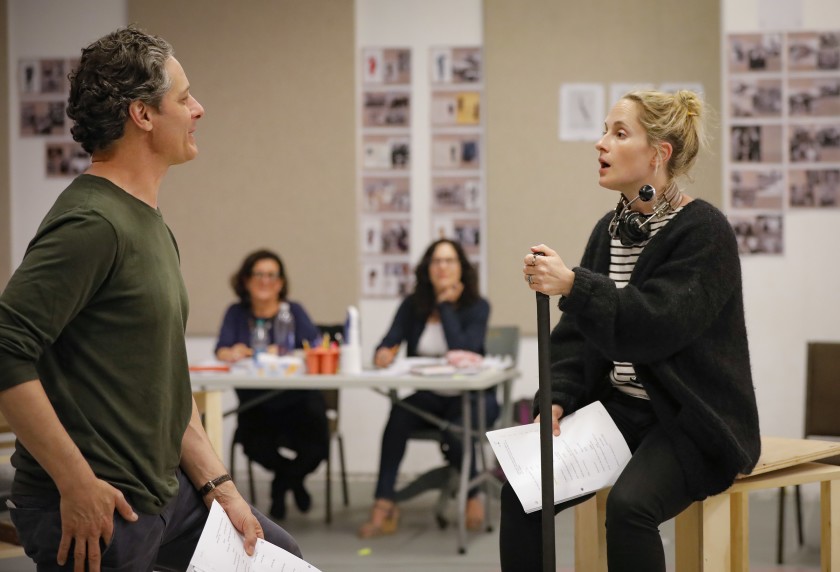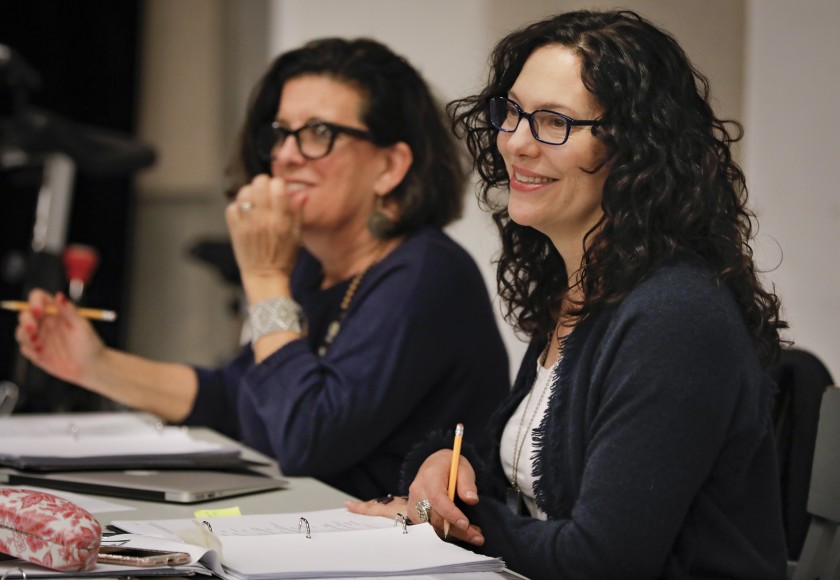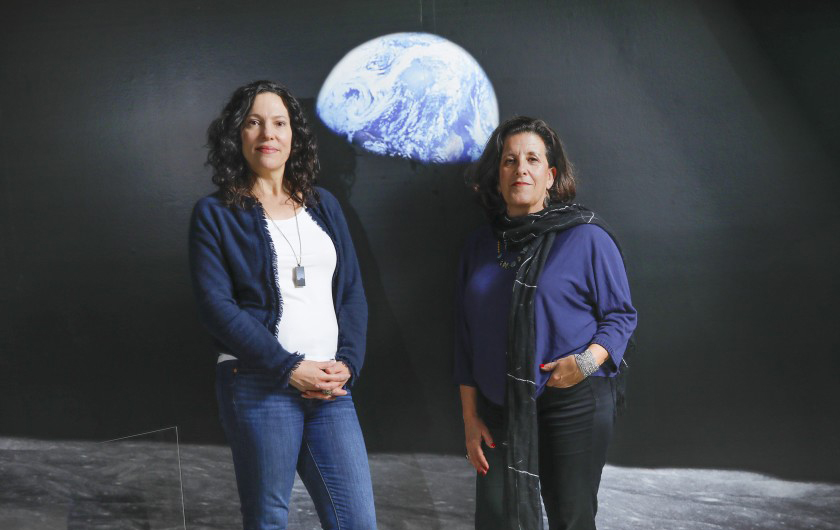
Photography by Howard Lipin


Laurel Ollstein’s play, which is getting its West Coast premiere at Balboa Park theater, is based on real-life stories of female trainees in the ‘60s-era ‘Mercury 13′ program.
The artists behind the Old Globe’s “They Promised Her the Moon” say there’s someone you need to meet.
Now if only they can figure out where to find her.
Playwright Laurel Ollstein and director Giovanna Sardelli have just emerged from a photo shoot at the San Diego Air & Space Museum, the Globe’s Balboa Park neighbor. But with a sense of enthusiastic mission, they whisk a reporter back inside.
Somewhere down the corridors and past the portraits of male aviators and astronauts is a modest display case — easy to miss, even for repeat visitors such as these two — that houses photos of female fliers.
“I Googled ‘first American female astronaut,’ and I absolutely thought it would be Sally Ride,” says Ollstein, referring to the late space-shuttle crew member (and University of California San Diego professor) who in 1983 became the first U.S. woman in space.
“And Jerrie Cobb’s name came up. I went, who is Jerrie Cobb? It was this Pandora’s box: ‘Why don’t I know this story?’ And the Mercury 13, which I’d never heard of. And none of my friends had heard of it. I mean, all of these smart women I knew, and none of them knew.
“It was quite shocking to me. There were so many names and stories.”
That was about eight years ago. As Ollstein began working on what would become “They Promised Her the Moon,” she learned about Cobb’s amazing exploits both as a pilot and as part of the Mercury 13 — officially known as the Woman in Space Program, and run by Randy Lovelace, a physician and top NASA official who was also a longtime friend of the legendary aviator Jackie Cochran.
Cobb and the 12 others who qualified for the privately funded program were put through the same brutal training and testing as the men in more touted Project Mercury, which eventually would make Alan Shepard the first American to travel into space.
Cobb went the furthest of all, undergoing testing in an isolation tank, among other trials, and wound up outperforming even most of her male counterparts.
Already the holder of multiple aviation records, Cobb stood out to Ollstein as a great figure for drama — a person “who wanted something so bad. She’s an incredible character. You want a character who’s hungry and passionate.
“When I read that she was in the isolation tank test longer than anybody, and that she hallucinated in it, I went, ‘THAT’s where the play is!’ So basically the whole first act is in the isolation tank.
And “I felt like I had to write it. Like, someone should tell this story if people don’t know it.”
Refining the story
The Globe’s production of “They Promised Her the Moon” won’t be the first, although it is the play’s West Coast premiere.
The piece was staged off-Broadway in 2017. Since then, Ollstein has teamed with director Sardelli and made significant revisions, workshopping the piece both in the Globe’s Powers New Voices Festival and in the new-play festival that Sardelli runs at TheatreWorks in Palo Alto. (The Globe production stars Morgan Hallett as Cobb, with Mary Beth Fisher as Cochran and Matthew Boston as Lovelace; the cast also includes Lanna Joffrey, Peter Rini and Michael Pemberton.)
Sardelli, who previously directed “The Whipping Man” and the world-premiere musical “Somewhere” for the Globe, said she’d likewise never heard of Cobb when she first read Ollstein’s play. Same for the Mercury 13 and Jackie Cochran.
“I mean, it’s really sad when you ask about female aviators,” she says. “(You hear of ) Amelia Earhart and Sally Ride, and sadly Christa McAuliffe,” the schoolteacher who died in the 1986 Challenger space-shuttle disaster. That’s who most people can name.”
In that context, the relatively low visibility of female fliers at the local museum is simply a reflection of how women had such scant opportunities in the field for so many decades.
And the issue hasn’t exactly gone away: As Ollstein and Sardelli spoke, news had just come out about the would-have-been-historic all-women spacewalk by International Space Station astronauts that was canceled because there weren’t enough suits available in the right size.
That incident wound up lampooned on “Saturday Night Live,” although those involved ascribed the problem more to logistics than sexism.
The Mercury 13 program ultimately dissolved after congressional hearings at which, among others, the celebrated astronaut (and later U.S. senator) John Glenn testified that putting women into space was not a good idea.
In part, says Sardelli, that likely had to do with self-interest along with gender bias.
“I mean, the men who went up in space had to fight so hard just to beat out a monkey,” she notes. “They barely made it; there wasn’t room. When you tell people there’s not enough room for everybody, that brings out ugly, competitive behavior.”
Once her dreams of going into space were dashed, Cobb retreated to South America, where she piloted humanitarian missions for more than 40 years.
“She loved flying, and the astronaut part kind of came at her, and it was totally unexpected that it was even a possibility,” says Ollstein. “So for that to be handed to you and then taken away is heartbreaking.”
Ollstein recalls that the first time an early draft of “Moon” was staged, at the University of Oklahoma, “people went out at intermission and Googled Jerrie Cobb. And I thought, ‘That’s what I want. Because I can’t tell everything — and I wouldn’t want to tell everything, anyway.
“I want people to go: ‘Why didn’t I know this story?’ That’s the thing that has just become more important and just so obvious to me, that there are so many women’s stories from history we just don’t know.”
To which Sardelli adds: “You start to think about how different America would have been if the first astronauts had included one woman, or one person of color, and if we had said: ‘This is America.’”


